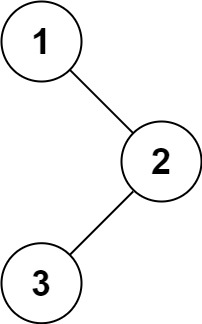LeetCode-in-All
94. Binary Tree Inorder Traversal
Easy
Given the root of a binary tree, return the inorder traversal of its nodes’ values.
Example 1:

Input: root = [1,null,2,3]
Output: [1,3,2]
Example 2:
Input: root = []
Output: []
Example 3:
Input: root = [1]
Output: [1]
Example 4:

Input: root = [1,2]
Output: [2,1]
Example 5:

Input: root = [1,null,2]
Output: [1,2]
Constraints:
- The number of nodes in the tree is in the range
[0, 100]. -100 <= Node.val <= 100
Follow up: Recursive solution is trivial, could you do it iteratively?
Solution
/*
* Definition for a binary tree node.
* struct TreeNode {
* int val;
* TreeNode *left;
* TreeNode *right;
* TreeNode() : val(0), left(nullptr), right(nullptr) {}
* TreeNode(int x) : val(x), left(nullptr), right(nullptr) {}
* TreeNode(int x, TreeNode *left, TreeNode *right) : val(x), left(left), right(right) {}
* };
*/
class Solution {
public:
vector<int> a;
void inord(TreeNode* root)
{
if(!root) return;
if(root->left) inord(root->left);
a.push_back(root->val);
if(root->right) inord(root->right);
}
vector<int> inorderTraversal(TreeNode* root) {
inord(root);
return a;
}
};

